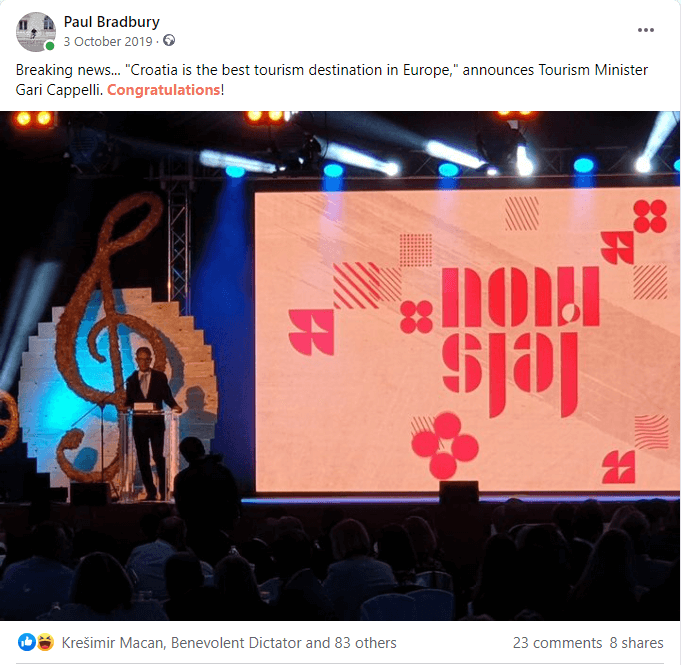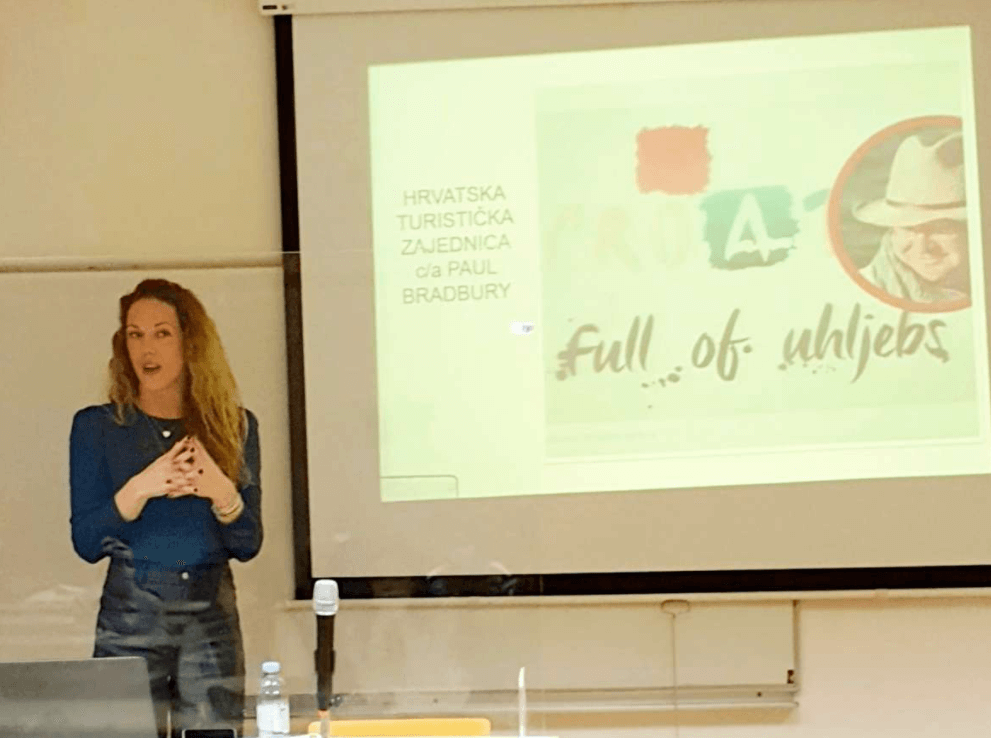Croatian Plava Laguna Strengthening Brand, Change for Hotels Coming
January the 2nd, 2022 - The Croatian Plava Laguna company is going to be spending 2022 strengthening its brand, and there is quite the change coming to its hotels.
As Poslovni Dnevnik/Marija Crnjak writes, as of this brand new year, the facilities operating under the Croatian Plava Laguna brand in Umag will no longer operate under the brand of the Spanish Melia, instead, all of the the facilities of the company will be repositioned under the brand and name Plava Laguna, the company recently reported.
As has since been learned from the Croatian Plava Laguna company, this will not mean a complete ''break up'' with the well known Spanish hotel chain, as their cooperation is set to continue according to the new model, which includes only sales being carried out through the Melia channel.
“After Plava Laguna's rebranding back in 2018, the company is continuing to strengthen the brand. As such, from the 1st of January, 2022, we're going to be moving the current Sol and Melia facilities from Umag to put them under the Croatian Plava Laguna brand. This means that from the beginning of 2022, all facilities in Umag with Melia and Sol in their names will officially operate under the brand and name exclusively under Plava Laguna,'' it was explained in their company announcement.
As is already known, the Croatian Plava Laguna inherited the contract with Melia from Istraturist, which the Luksic group purchased way back in 2014 from Zagrebacka banka.
Zagrebacka banka initially joined Istraturist in 1996 after the transformation of the company, and two years later, Melia Hotels International was hired for sales and operations to apply international standards to their tourism services. This remained Melia's only engagement in all of the Republic of Croatia. Plava Laguna then launched the new brand into business in 2018, as a completion of the merger of Umag's Istraturist.
"With this merger, one of the largest tourist companies in all of Croatia was created, which manages four resorts (Park, Plava, Zelena and Stella Maris), as well as nine camps, which operate on the market under the brand ''Istracamping'' by Plava Laguna. Thus, Plava Laguna will enter 2022's summer tourist season with a unique portfolio under its belt, which will enable the strong standardisation of processes and activities, as well as the creation of new and unique Plava Laguna products and services,'' the company pointed out.
For more, check out our dedicated business section.
10,000 Tourists in Istria During Christmas and New Year Holidays
December 31, 2021 - About 10,000 tourists in Istria County will celebrate the New Year in fifteen open hotels and two camps on the Istrian peninsula. The Istria County Tourist Board reveals that this is a 3x increase in guests compared to last year.
"Almost ten thousand guests are currently vacationing in Istria, which is three times more than last year when 3,750 guests stayed during the Christmas and New Year holidays, but twice less than the record 2019 when 21,500 tourists stayed in our county," says Istria County Tourist Board director Denis Ivošević, as reported by HRT.
He adds that he is satisfied with the number of guests because "if the epidemiological situation allows it, it is the announcement of a good tourist year in 2022."
During December, 105,000 tourists stayed in Istria, which is 27 percent less than two years ago when there were 142,166.
Most guests stay in Poreč and Rovinj, with domestic tourists in the lead, followed by guests from Slovenia, Germany, Austria, and Italy. According to the Istria County Tourist Board, most guests stay in hotels, almost 60 percent.
Arena Hospitality Group reports that during the winter months, including New Year's Eve, they opened the Park Plaza Belvedere hotel in Medulin and the Arena Grand Kažela camp in Medulin. They expect about a thousand guests who will stay two to three days. Their guests are mainly from Austria and Slovenia, and this year, they noticed increased interest from domestic guests.
Following the epidemiological situation and prescribed measures, Valamar will organize a unique holiday program for guests of its hotels and camps, such as live music and DJ performances, in facilities that operate during the Christmas and New Year periods.
During December and the holiday season in Rovinj, Maistra's Grand Park Hotel Rovinj, Lone, Adriatic, Eden, Amarin, then Pineta, apartments Riva and camping Porto Sole in Vrsar were opened.
For more, check out our dedicated travel section.
Croats, Germans and Slovenes Make Up Croatian Christmas Tourism Numbers
December the 28th, 2021 - Croatian Christmas tourism figures have been dominated by Croatian tourists exploring the rest of the country, Slovenian visitors and of course, the always faithful Germans.
As Poslovni Dnevnik/Suzana Varosanec writes, along with the Slovenes and Germans, Croats exploring their own country have so far been the most numerous guests staying across the Republic of Croatia during the Christmas and New Year holidays, according to the latest sales statistics of Croatia Luxury Rent.
In terms of Croatian Christmas tourism numbers, these are followed by Austrians, Italians, Hungarians, Poles and Serbs, and in addition to the above markets, guests from France, Switzerland and neighboring Bosnia and Herzegovina are also quite numerous in the country at this moment in time.
As they announced, they are especially happy that the number of domestic guests is systematically growing from year to year and that "Croats along with Germans and Slovenes will make up the largest number of guests who will stay in Croatia over 2021's festive period.''
"Croatian guests topped the list of the most numerous guests during last year's festive period, which was to be expected due to the situation and the events caused by the coronavirus pandemic at the time. This festive season, due to somewhat more liberal measures and the possibility of crossing borders much more easily, the situation has changed somewhat, so, along with the Croats, German tourists are the most numerous in CLR accommodation units, while the Slovenes are in third place,'' they explained when looking at their Croatian Christmas tourism figures.
This year's sale of festive tourism arrangements has given rise to a very specific situation according to which, according to them, Central Dalmatia has almost equated the percentage of the number of arrangements sold up north in Istria. However, in the last ten days, things have returned to their earlier standards.
"Istria is at the top with an almost 45 percent share in the total number of reservations sold, followed by Dalmatia and the islands with 29 percent, Kvarner with 18 percent, and the continental part of the country, which accounts for 8 percent,'' according to the CLR.
For more, check out our dedicated travel section.
Could Sustainable Croatian Tourism Branding Result in More Luxury?
December the 20th, 2021 - Could sustainable Croatian tourism branding be the key to encouraging more luxury tourism? As all things renewable become more and more mainstream, it seems that new opportunities lie in way for the country so well known for damaging mass tourism and counting overnight stays.
As Poslovni Dnevnik/Marija Crnjak writes, renewable energy sources, energy and water savings, green procurement, local food, food waste reduction, sorting and recycling, hazardous chemicals-free business operations… There are many criteria that are entering the fast-growing trend of sustainable tourism, and they're more or less applied worldwide.
Along with national governments and public institutions, sustainability has become the goal of every serious company that plans to increase its competitiveness in the coming period. In parallel with the introduction of sustainable solutions, more and more attention is being paid to branding sustainable products and services, which will bring them better recognition and market positioning, and many Croatian players have woken up and are very much involved in this race in addition to global enterprises.
Sustainable Croatian tourism branding could finally result in year-round work and less seasonal influences on the domestic economy.
''Eco green hotels'' is the name of a new brand launched back in November by the National Association of Family and Small Hotels, with the aim of responding to the growing needs of modern travellers for environmentally friendly accommodation. This is a hotel segment that already meets sustainability goals in part because most facilities decide to work all year round.
Depending on the level of implementation of green and sustainable solutions, hotels will receive a silver, gold or platinum label, and the first step in this ambitious task is to educate more than 200 members of the association that has already started.
''After the training session, there will be a cycle of investments that will last at least two years, so Croatia could have the first eco-green family and small hotels as early as 2023. Green business has become a necessity not only because of our conscious guests' demands for environmentally friendly accommodation, but for savings for hoteliers themselves. What is also extremely important is that in this way, we'll be able to give our contribution to the decarbonisation of the planet,'' pointed out Sime Klaric, President of the National Association of Family and Small Hotels.
Among large Croatian hotel companies, Valamar Riviera was the first to make a more serious investment in its first eco resort in beautiful Stari Grad on the Central Dalmatian island of Hvar, with the creation of a totally new brand - Nature resort. Nature resort is the new Valamar concept of a fully sustainable eco-resort positioned primarily for family holidays. The construction of the resort will be achieved by respecting the highest standards of green building, which includes using only environmentally friendly materials with minimal impact on the environment, the use of renewable energy sources and a high level of energy efficiency.
The Valamar Nature resort on the island of Hvar is the first tourist project that will use prefabricated buildings and modular construction designed according to Valamar accommodation quality standards. The concept is inspired by nature and sustainable design, meaning that the architecture of the resort will fit well into the natural environment of the island in terms of the the design of the buildings, while the interior design is being dealt with by signed by local designers and artists using local traditions, looks and materials.
Construction will be carried out in in two phases
Felled trees will be used in landscaping, and each felled tree will be replaced with newly planted ones. Great emphasis will be placed on the offer of local food and groceries produced right there on the island, while digitalisation will eliminate the use of paper throughout the hotel. The project is planned to be built in two phases throughout 2022 and 2023, and in order to realise all of these green initiatives to their absolute full potential and realise all aspects of sustainable resort development, there is a plan in place to apply for green EU funds for the project.
Helios Faros' business development plan assumes investments in the total amount of around 800 million kuna in sustainable high value-added tourism that will have a positive impact on the economic growth of the island. By the year 2025, the reconstruction and construction of three hotels and resorts of categories 4 * and 5 * with a total capacity of 700 accommodation units is planned.
Quartz Inn Hotels, a new European hotel brand for independent sustainable hotels that recently presented itself at the WTM fair in London, is also seriously counting on Croatian facilities in its future portfolio, and their plan is to expand to at least 100 hotels across Europe. Quartz Inn Hotels Ltd was founded by Spaniard Ignacio Merino and Dutchman Alexander Zawadzki, who both have extensive experience in the hotel industry as well as in online travel agencies and travel startups under their belts. Sustainable Croatian tourism branding could be very possible with such an initiative taking hold in the country.
“We're the first sustainable hotel brand for stand-alone hotels in Europe, and our goal is to connect sustainable accommodation from across all European countries, while preserving the authenticity of each facility. We focus on sustainability, we help hotels become more ''green'' and in that way we're working to create a more sustainable tourism industry. By joining our brand, hotels gain more visibility internationally, which leads to higher revenue and more direct bookings,'' said Ignacio Merino when explaining the basic principles of the business idea created in the midst of the coronavirus pandemic, which came about partly as a result of the crisis itself.
"Independent hotels have been the hardest hit by the pandemic and they simply don't have the same means as larger chains have at their disposal to try to overcome the situation. We talked to many of them and decided to form a community that will support them. Through our partners, we provide them with the latest technology to manage things for them, covering all commercial areas, such as OTA distribution, connectivity, marketing, online reputation, online signups, resales, booking and revenue management, to optimise their hotel prices and maximise their benefits,'' he explained. In addition, they offer their members a free hotel academy for hoteliers and staff. In addition to hotels, guesthouses and holiday villas are also welcome.
They currently have dozens of contracts signed across Europe, and plan to conclude next year with at least 100 facilities within the chain. Their main goals are to reduce energy and water consumption and eliminate disposable plastic in rooms, while encouraging sustainable eating habits and contributing to the preservation of the local culture and economy.
Sustainable Croatian tourism branding could lead to a far better situation each and every year when it comes to arrivals from across the globe. Currently trapped by the ''sunshine and sea'' label which expires after about three months annually despite multiple attempts to extend the tourist season and expand what the country can offer. The coronavirus pandemic might just be the reset button for sustainable Croatian tourism branding and lead to a far better way of doing things than simply sitting back, counting the overnight stays on the eVisitor platform and rubbing our hands.
For more, check out our travel section.
HTZ Aims To Make 2022 Turnover Amount to 90% of 2019 Tourism Turnover
ZAGREB, 18 Dec, 2021- The Croatian Tourism Board's (HTZ) revenue in 2022 is expected to amount to HRK 311 million, 9% more than in 2021, and it will focus all its activities to further enhance Croatia's status as the most desirable and safest Mediterranean destination and ensure 90% of the tourism turnover of 2019.
This was said by HTZ director Kristjan Staničić, who also noted that these goals are to be achieved by intensive marketing activities and PR campaigns, designed to suit individual markets.
Promotional campaigns will focus on boating and cycling tourism, gastronomy and wine tourism, natural attractions and active and medical tourism, he stressed in an interview with Hina.
In 2022 the HTZ's activities will focus, apart from the national market, on the traditionally close, neighbouring markets like Germany, Slovenia, Austria, Poland, the Czech Republic, Slovakia, Italy and others. As for remote markets, emphasis will be put on the US market.
Next year the HTZ plans to open new offices, including in Ukraine and Spain. Also planned for next year is a new strategic marketing and operational plan as a long-term framework defining communication strategies and guidelines for affirming Croatia as a high-quality destination, Staničić said.
Epidemiological situation, clear protocols, quality products
Asked about the coronavirus pandemic and the related restrictions, which also affect the travel sector, and about plans for 2022 in that regard, Staničić said that all goals set can be achieved, on the condition the epidemiological situation is favourable and there are clear protocols for cross-border travel and a high level of health protection in destinations, with a sufficient number of testing centres, as well as quality and attractive tourism products.
For more on lifestyle, follow TCN's dedicated page.
For more about Croatia, CLICK HERE.
Ever Been to a Party Where the Host is Suing You?
December 17, 2021 - Ever been to a party where the host is suing you? A foreign perspective of the annual Days of Croatian Tourism - aka Days of Croatian Self-Congratulation - conference, which reveals a lot about the way tourism in Croatia is run.
I am not sure how to describe the annual late-season event known as Days of Croatian Tourism, which usually takes place in October at the end of the season, bringing together the great and the not so good of the official tourism bodies. The event almost always takes place on the coast in one of Croatia's top destinations (unless someone annoyingly pushes for it to be held in Slavonia, as happened in 2019). The programme consists of a few (but not many) presentations (usually high-quality international speakers and topics) which are barely attended, nice hotels (which are full of tourism workers), dinners and cocktail parties, which are VERY well attended, and an evening of awards and self-congratulations broadcast live on national televsion.
I find the event addictive and unmissable, as you can learn SO much about the realities of Croatian tourism from the way it is run, and who attends what.
And it is the only event I can think of where I learn about a new tourist 'destination' each year, as seemingly the most obscure village in Croatia will win a self-congratulatory award for something.
Hardly anyone attends the actual quality presentations - why would you when there is coffee in the sun to be enjoyed - but I try and attend every one, as they are very instructive - for example Croatia Travel Trends for USA Market: Al Merschen Presentation on Hvar at Days of Croatian Self-Congratulation in 2018.
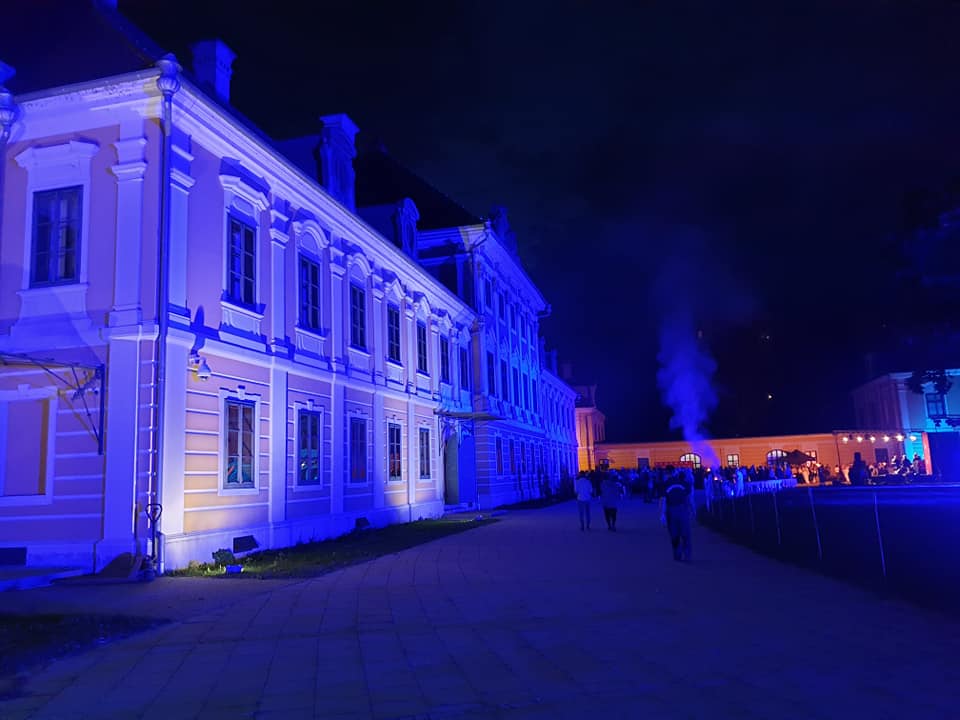
For me personally, I find the event a strange one to be at. Apparently, I am seen by some as a divisive figure in Croatian tourism, and nowhere is this more in evidence than at Days of Croatian Self-Congratulation, which is co-organised by the Kingdom of Accidental Tourism, The Croatian Chamber of Economy, HRT television, and the Ministry of Tourism and Sports, according to the official website.
I will never forget entering the courtyard of Eltz Palace in Vukovar to the welcome drink at DCS-C 2019 (photo above), where I enjoyed the same three reactions I had encountered in Hvar Town the previous year. Many looked away to avoid me altogether, some who appreciated our work came to say hi, and a sizable group of official tourism workers who are normally very friendly and supportive looked the other way to avoid any contact in front of prying eyes. I am totally fine with that, and I don't judge. I have lived in Croatia long enough to know how things work.
The Gala Awards night is unmissable, and it gives you an inkling of what a North Korean party convention must be like. So much self-congratulation and bombastic statements. Here is my favourite of the lot, from the legend that was Minister of Tourism Gari Cappelli, who declared to the adoring faithful that...
Croatian is the best tourist destination in Europe!
Huge cheers on this incredible success which was based on nothing more than the minister making up a soundbite. And while everyone else was cheering, I only caught sight of one other person prepared to make eye contact with me and mouth
What the F...?
Such things are normal at Days of Croatian Self-Congratulation.
This year's event was announced late, very late. So late in fact that by the time it hit the official website (or at least very soon after), there were no places left. COVID measures were the reason, of course, but a number of hotels expressed their frustration to me that they were not even informed that the event was taking place until it was too late to apply. The only way to go was as an accredited journalist.
I hesitated.
This year's event was the other side of Dubrovnik, but I knew that I would be able to have some very productive meetings all in the same place with potential partners for our CROMADS project. But given that I was currently being sued by the Kings, who were one of the hosts of the event, how unpleasant would the reception be this time?
I decided to apply. Not surprisingly, there was no reply.
When there was no reply the next day (the event was 4 days away) and no answer to my calls, I made a couple of phone calls and pulled in a favour and was told that of course I was welcome to come and that the Croatian National Tourist Board would be contacting me to confirm. And I did get an email from the official event email. It went like this:
Dear Sir,
you have already been put on the list to participate or otherwise you would have been notified. Registration is closed only for other participants and not media representatives.
I see. Welcoming official Croatian hospitality at its finest.
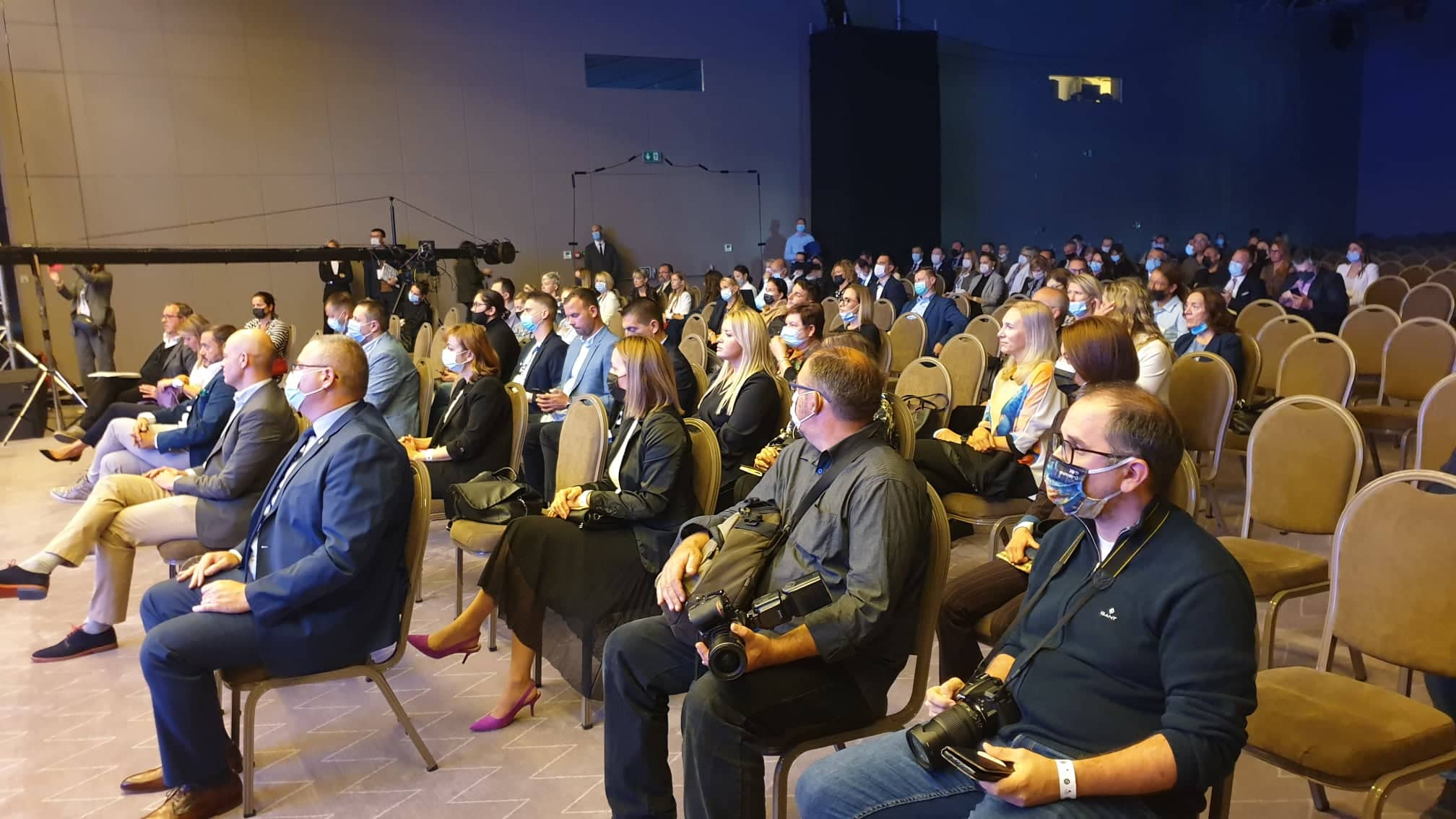
The programme was much more limited this year, but I decided to attend the seminars, especially as the first panel had some interesting speakers from TUI Nordic, easyJet Holidays, and Expedia. The theme of winter tourism in Split was an ongoing discussion on TCN. I doubted that I would be allowed to ask a question, but perhaps I could mingle with the speakers afterwards.
As usual, the number of attendees was minimal. There was actually lots of space in the front row, so I placed myself there, so as to give myself a better position in the event of opportunities for questions.
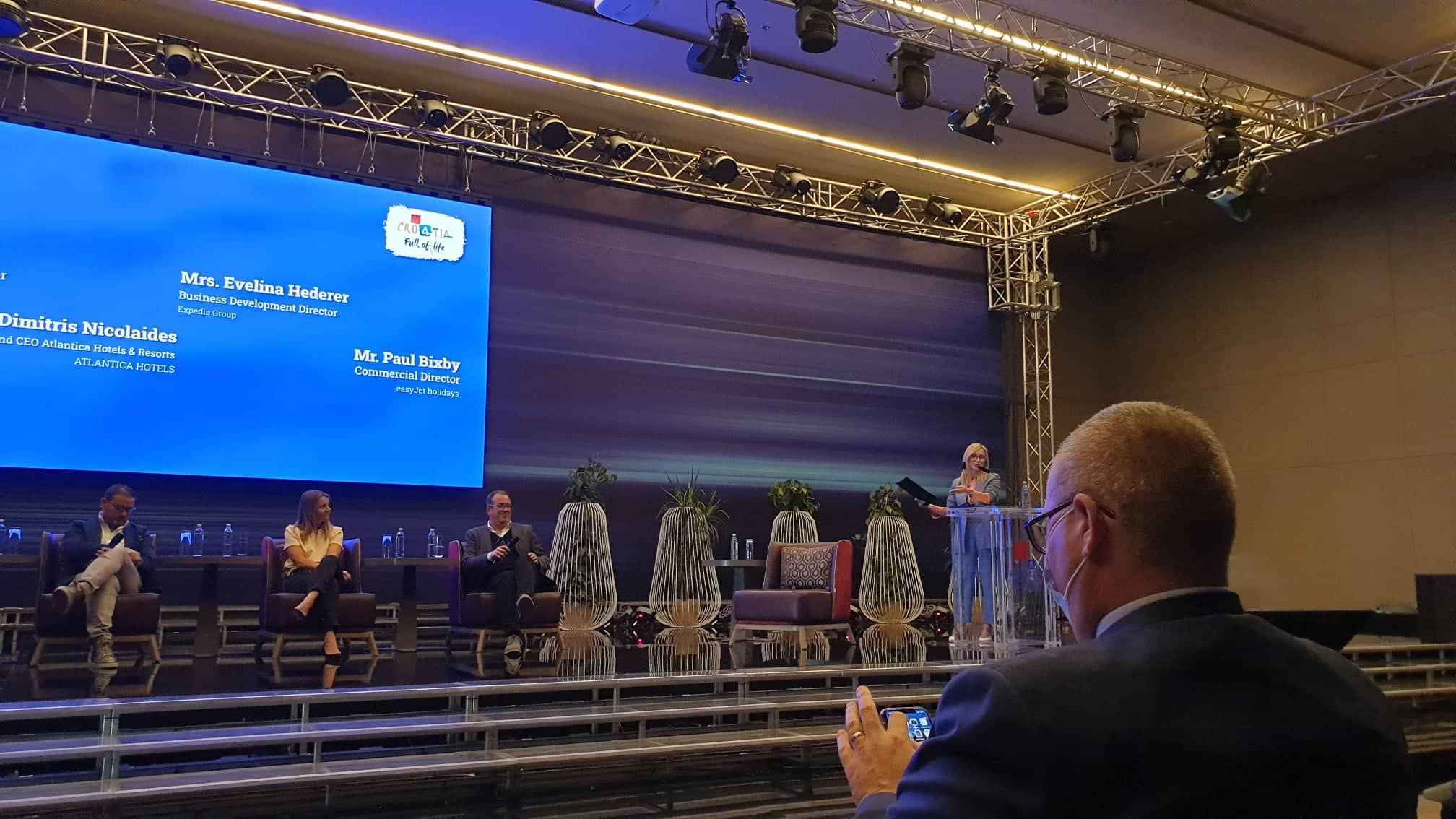
It was a fascinating panel, or at least I thought so. I found myself inadvertently sitting next to the Director of the Croatian National Tourist Board, who spent most of the time on his phone before walking out of the panel halfway through.
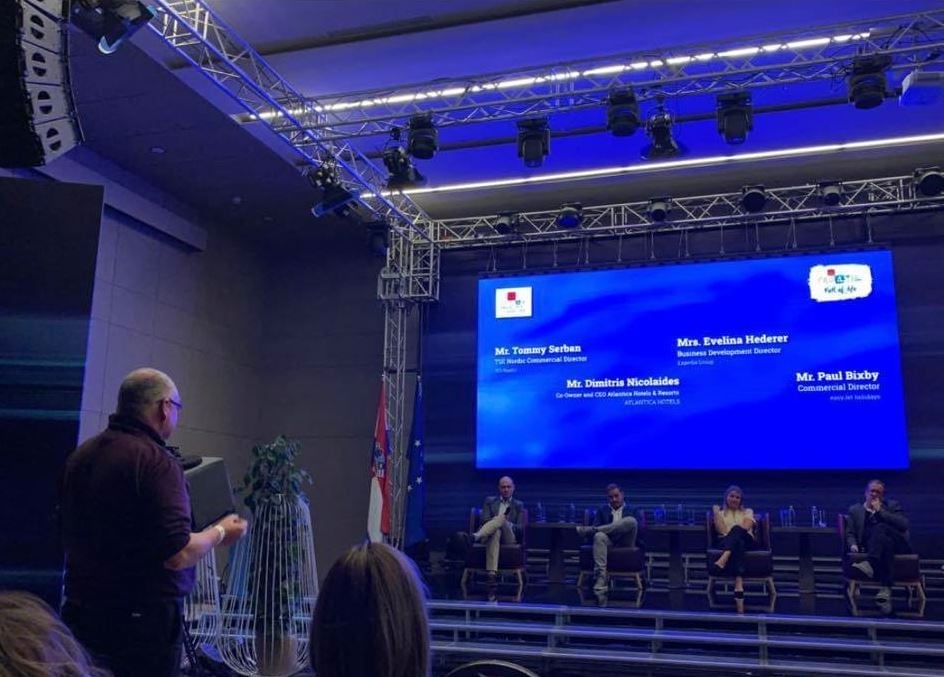
All this gave me an opportunity to ask questions after all. Nobody else had anything to ask, and so I got to ask a couple of questions on winter tourism.
That led to some interesting discussions at DCS-C, which led to more discussions and the formulation of a plan.
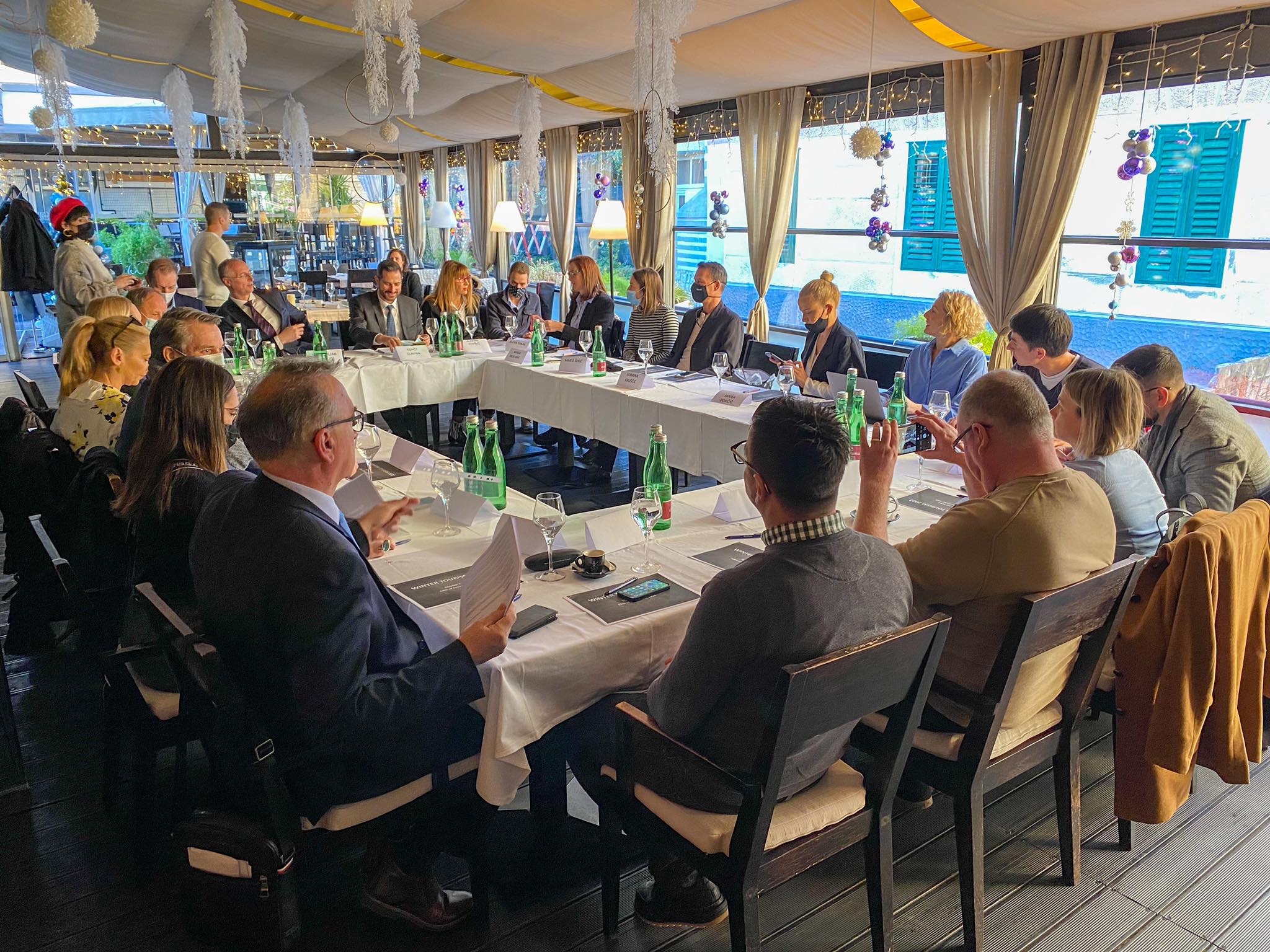
That plan resulted in this week's TCN Split Winter Tourism Roundtable at CHOPS Grill in Split, a high-energy event which was attended by (among others), the Mayor of Split, State Secretary of the Ministry of Tourism and Sports, the Split and Central Dalmatia Tourist Board directors, Split Airport, the Croatian Chamber of Economy, GMs of 5-star hotels, as well as tourism consultants and representatives from the hotel, hostel, restaurant and MICE sector. You can read more about it in Reflections on the First TCN Split Winter Tourism Roundtable.
A positive initiative between the public and private sector. We all meet again next month.
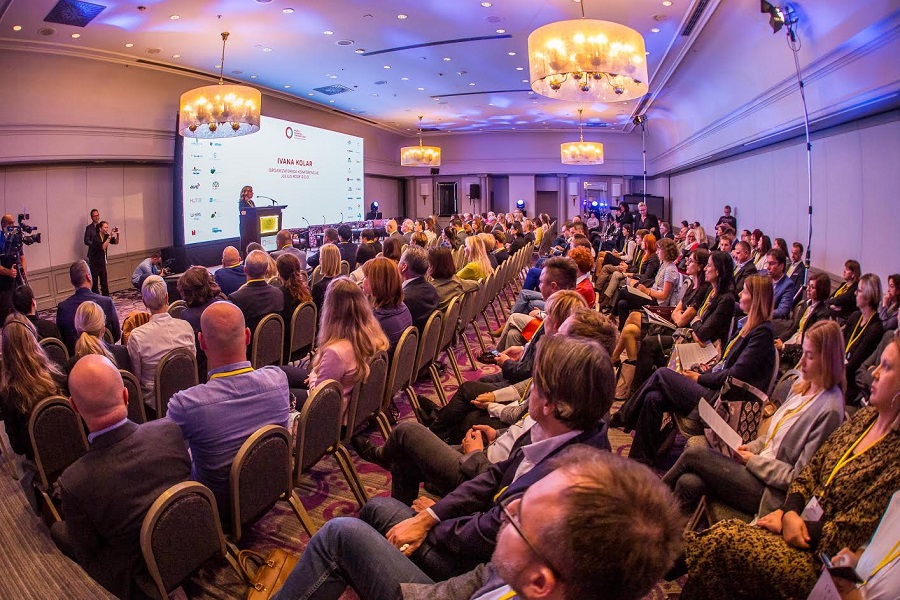
I should point out that this lack of attendance listening to international experts who have been flown in at great cost is a normal thing at Croatian conferences.
I pointed this out at the 2019 Croatia 365 conference in 2019. Above you see what they want you to see - the official photos from the opening session which accompany the press release.
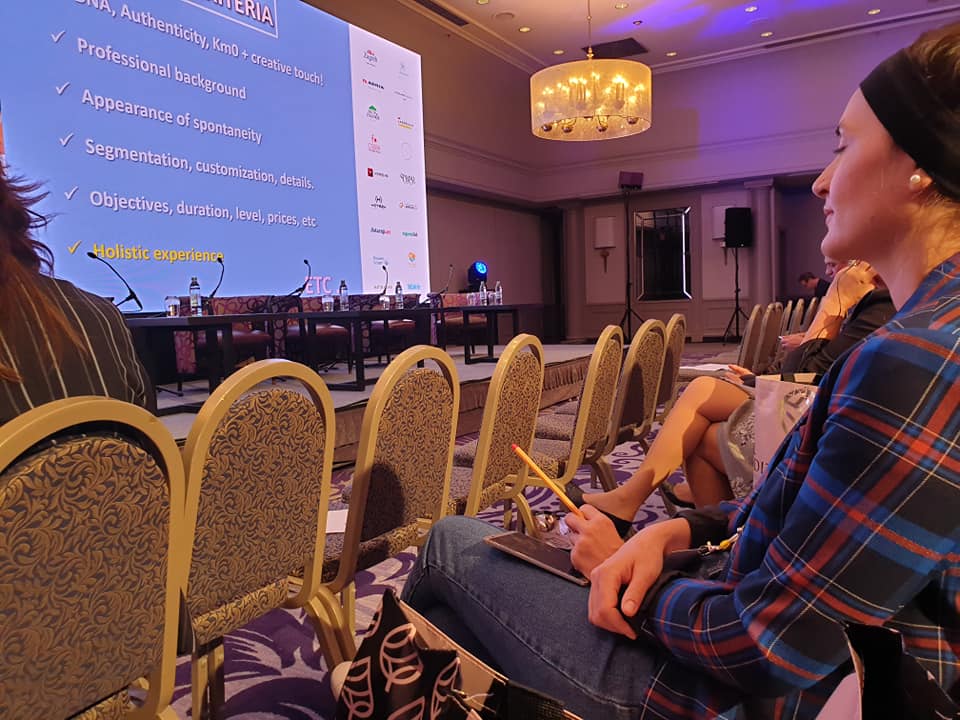
And this is the reality during the second session and the rest of the conference (Photo copyright Annoying Fat Blogger, the beneficiary of two ongoing SLAPP lawsuits). Read more in Creativity, Best Practices & Absenteeism at Croatia 365 Conference in Zagreb.
It was time to go the 2021 DCS-C first-day cocktail party. With a couple of pints in the system, I was ready to be the pariah in the room, knowing I could count on at least 3 people in the room if everyone turned their backs on me. It is poor form to socialise with a chap being sued by the host, after all.
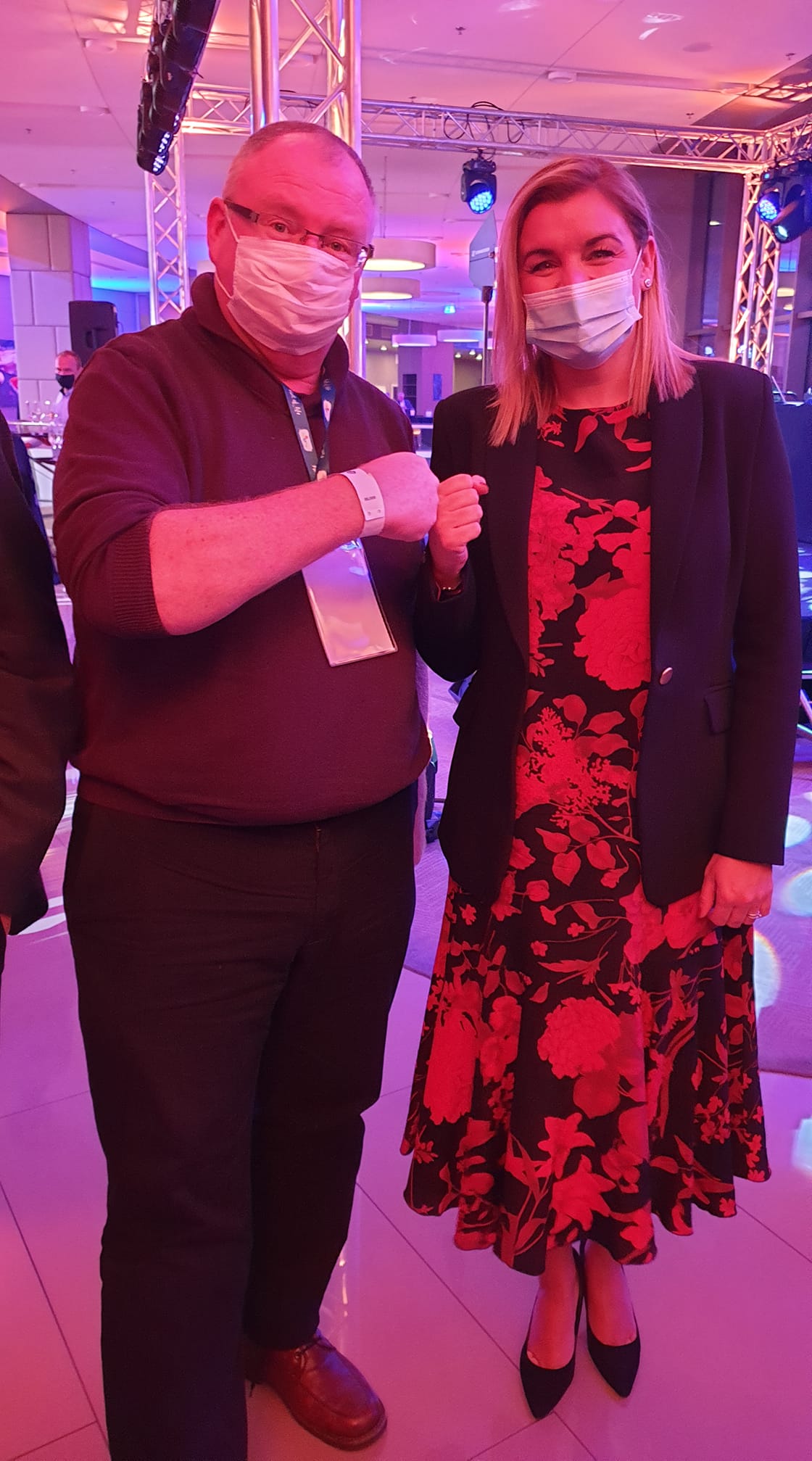
The first person I saw in the room was State Secretary for Tourism, Tonci Glavina (who also made an immense contribution to our Split roundtable this week), and he greeted me warmly, saying that Minister Brnjac wanted to say hello.
And she did, and was very friendly. I let her get back to her duties, and I look forward to meeting her shortly to discuss certain initiatives by TCN, such as the Vukovar Card.
I was very grateful for her support, and it was part of something interesting in that room. The number of people turning their backs on me this year was signiicantly less than before. Indeed, there were some tourist board directors I have never been able to speak to who came over to say hi and learn more about the CROMADS project.
Have you seen the CROMADS promo video yet?
Or the presentation of the CROMADS platform at VIP Day at Digital Nomad Week based in Bali last week? A new, sustainable approach to Croatian tourism, based on authentic experiences all over Croatia, 365 days a year.
The level of support for the CROMADS platform at DCS-C was highly encouraging, both in words and financial commitments. But the other thing I noticed as I walked around the room talking to people is how little regard the national tourist board is held in these days by official tourism workers. A lot of people think that when I am criticising Croatian tourism bodies, I am attacking them all. I am not at all. The main focus of my criticism is the institution which is suing me - the Croatian National Tourist Board. To go to this year's event and hear not one good word said about the work they do (and plenty of complaints) tells its own story.
Next year, I plan to start a new series on TCN called The Emperor's New Clothes: the Truth about the Croatian National Tourist Board. Some of the stuff I am learning is really quite extraordinary. It will probably result in more SLAPP lawsuits, but as I have the Legendica Extraordinaire, Croatia's leading media lawyer Vanja Juric on my side and providing me with excellent legal advice (including this article), I am not worried about those any more.
And Vanja is also putting my lawsuits to good use. Here she is as a guest lecturer at the Faculty of Political Science at the University of Zagreb recently, talking about the joys of representing journalists, publishers and fat bloggers. I did feel a little bit proud that she is using what one journalist called 'the biggest PR own goal in the history of the Croatian National Tourist Board' to good use as a case study.
You can follow our legal journey in Diary of a Croatian Lawsuit here. The latest installment, Diary of a Croatian Lawsuit: Substitute Lawyer Miraculously Appears! is truly epic.
See you at Days of Croatian Self-Congratulation 2022!
Croatian Tourism Investments Fall by Over 60%, State Should Step In
December the 8th, 2021 - A decline in tourism, and as such Croatian tourism investments, can more or less explain almost the entire decline in GDP. A massive 8.1% decline back in 2020 was certainly not what anyone needed, or could have ever imagined coul happen after the record year of 2019.
As Poslovni Dnevnik/Marija Crnjak writes, the overall decline of GDP in Croatia back in pandemic-dominated 2020 can be explained by the decline in tourism, the most affected industry that has led to a decline across all related sectors, while at least 4.5-5 percent of total GDP growth in 2021 can be attributed to the subsequent recovery of tourist traffic.
This shows the exceptional importance of tourism for the Croatian economy, but despite a significant increase in tourist traffic this year, the situation remains dramatic as the crisis has caused a sharp drop in Croatian tourism investments and the recovery will not be spontaneous without additional investment incentives from the state.
Analyst Velimir Sonje warned about precisely that, presenting his research on the connection between tourism and the pandemic recently at the Congress of Hoteliers, organised by the Croatian Hotel Employers' Association (UPUHH).
“Croatian tourism investments and its activity is in a sharp decline of 60-66 percent when compared to 2019 and the duration of such a situation threatens to weaken the positive development effects of tourism, such as a proven contribution to alleviating emigration from Croatia. We got the impression that after this season, which was short, but successful, that everything would be fine and that we're finally returning to normal. But a spontaneous recovery won't happen unless there is a strong recovery in investment soon. This requires investment incentives, and investors' expectations are focused on the new Law on Investment Promotion and the implementation of a new regional aid map,'' explained Sonje, whose research is based on the results of a survey among the ten largest hotel companies in the country, with total revenues of 5 billion kuna recorded back in 2019.
"Paradoxically, despite the fact that tourism is crucial for economic recovery, the European Commission has allocated only 5 percent of the total amount from the National Recovery and Resilience Plan to this sector," concluded Sonje.
The Director of the Croatian Tourism Association, Veljko Ostojic, pointed out the four biggest challenges that the hotel business will face in 2022. With the return on investment, after the 2021 season in which Croatia had the best tourism results in the Mediterranean and Europe, the biggest challenge in preparation next year will be the sheer lack of qualified personnel, an issue present in the sector throughout Europe at the moment.
"In Croatia, it isn't only a question of engaging domestic workers, but also a faster and more flexible administration in hiring foreign workers. The second most important issue will be the continuation of investments in quality, without which Croatia will not be competitive in relation to other Mediterranean countries in particular. There will be an important contribution of money for NPOO projects, but also the legislative framework, primarily addressing the issue of tourist land. We're in intensive talks with the Ministry of Construction and State Property and I believe that in the coming weeks we'll be able to find solutions that will enable investments and generate significant revenues to the state budget,'' believes Ostojic.
The fourth important factor will be the unfolding epidemiological situation, which is still a challenge and a trigger for the majority choosing a holiday destination, but Croatia and the sector have done a great job in the last two years, so there are no severe worries. Hoteliers also point out the important challenge that inflation and the situation with supply chains will pose in financial operations.
"It will be a very big challenge that we won't be able to mitigate through rising prices and many will not be left for investment. Without the help of the state, through the Law on Investment Promotion and similar solutions, we cannot expect the recovery of the investment power of the tourism sector,'' warned Popovic.
For more, check out our business section.
Sustainable Croatian Tourism: Valamar Announces New Investment Cycle
December the 5th, 2021 - Sustainable Croatian tourism is a goal that the vast majority of actors in this most important economic branch are busy aiming for as mass tourism continues to bring as many issues as it does kuna into the country. Valamar is making concrete moves in this direction.
As Poslovni Dnevnik writes, following on from the finalisation of the second phase of the capital increase in Imperial Riviera worth a massive 690 million kuna, the Supervisory Boards of the Valamar Group companies approved the transfer of three hotels down in Dubrovnik from Valamar Riviera to Imperial Riviera, a joint venture for Valamar and Allianz ZB for the management of mandatory and voluntary pension funds.
This capital increase and the transfer of the hotel to Imperial aims to accelerate significant investments in the reconstruction and further construction of resorts in the destinations of Dubrovnik, Makarska and Rab, for which Imperial has planned 2.1 billion kuna over a five-year period. Soon enough, the Valamar Group will launch investments totaling 500 million kuna in hotel and tourist facilities and facilities managed by Valamar.
Sustainable Croatian tourism, more precisely ''green'' tourism, and digital transformation, as well as investments in the premium segment, will form the backbone of the development of Valamar's portfolio in the coming period. In order to implement investments and transform their business, the management of the Valamar Group will be reorganised, for which the top management was given a mandate until 2026.
President of the Management Board Zeljko Kukurin and member of the Management Board Marko Cizmek have been reappointed for a new five-year term, while former Vice President Ivana Budin Arhanic has been appointed to the Valamar Riviera Management Board with a focus on further internationalisation, sustainable Croatian tourism and business digitalisation.
Alen Benkovic has been appointed President of the Management Board of Imperial, and is set to become Senior Vice President of the Valamar Investment Group. Davor Brenko has been appointed Senior Vice President of the Valamar Sales and Marketing Group with a focus on product development and increasing direct sales. David Poropat will take over the position of Senior Vice President of Operations with a focus on strategic partnerships and service management.
Sebastian Palma has been appointed to a new term as a member of the Board of Finance for Imperial Riviera and becomes Vice President of the Strategic Controlling Group. Ines Damjanic Sturman has been appointed Vice President for Human Resources Development as a strategic function in Valamar's business, and Tomislav Dumancic is becoming Vice President for Dubrovnik and Dalmatia, where significant investments are planned in the coming period. Vlado Mis, the current President of the Management Board of Imperial Riviera, will become an Advisor to the Management Board and Director of the destination of Rab.
Croatian sustainable tourism is something that will allow the country to escape from the binds of the classic ''three months of sea and sunshine'' that it has been embedded in ever since tourism took off here following independence. Given that this little country has so much to offer and diversity like few others, making this move could place it firmly on the year-round tourism map and allow for a far more stable economy.
For more, check out our dedicated business section.
Croatian Tourism Provides Desperately Needed Cash Injection for Economy
December the 3rd, 2021 - The Croatian tourism sector has provided a very, very welcome cash injection to the domestic economy following this summer's remarkably successful season. It couldn't have come soon enough.
As Poslovni Dnevnik/Radmila Kovacevic/VL writes, 2021's summer tourist season was above all expectations. While summer might well be over now, Croatian tourism for this year is not over yet. About 13,000 guests are currently staying in the country, among them certainly some digital nomads, who additionally marked the unexpectedly successful 2021 for Croatian tourism and the economy as a whole.
All of this is, of course, in the shadow of the ongoing coronavirus pandemic, but the issues caused by that were far less problematic than we feared before the arrival of the summer months and almost negligible in relation to the damage suffered by some other countries in the rest of the Mediterranean, ie Croatia's competition.
Let's just mention the southern European tourist superpower, Spain, which before the pandemic hosted up to 48 million tourists a year, this year in the first eight months had to settle for a meager 30 percent of the traffic they enjoyed back in 2019. Croatia, on the other hand, concludes the eleven-month period of 2021 with 13.5 million guests who spent 83.5 million nights in the country. All of this is primarily thanks to an exceptionally favourable epidemiological picture which lasted and lasted. That has now, of course, changed quite a lot.
From the beginning of the year to November the 29th, Croatian tourism managed to ''grab'' 67 percent of arrivals from the best tourist year ever, 2019, and measured by overnight stays, things were even better - the country reached as many as 77 percent of those recorded back in pre-pandemic, record 2019. It should also be noted that some destinations across the country in the peak summer weeks even surpassed the traffic from that record year.
Croatian tourists with 2.2 million arrivals were second, following the Germans, and with 12 million overnight stays, they reached 89 percent of the results from 2019. Slovenians and Austrians with 1.1 million arrivals share third place, and the Poles, with a million arrivals, set new records. Tourist successes are unfortunately not evenly distributed along the coast. The season was simpler and more successful for places and regions accessible by car, while air destinations in the south such as Dubrovnik still struggled with minuses in air traffic, and then with a greater shortage of guests.
However, it turned out that the tourists who managed to arrive in Croatia during the coronavirus pandemic remained on holiday for a few days longer than they typically did before, and they filled the best and most expensive Croatian Adriatic accommodation without any real problems. This was the cass even with higher prices than last year, which is a luxury that some hotels could afford thanks to good demand. This was made all the easier because some wealthy tourists, who used to choose either exotic destinations in Asia or Central America, or, if they wanted to stay in Europe - Tuscany, Provence, South Tyrol zbog, finally discovered the Croatian coast this summer, primarily heading to beautiful Istria.
However, Croatian hosts from the north to the south of the country were convinced that quality and safety are much more important to guests during the pandemic than pricing. We will have to wait a few more months for the data on foreign exchange earnings from tourism to see whether or not that's true, but it was already clear in the first half of the summer from the fiscalised receipts and invoices issued that we've had some generous guests visiting in 2021.
Minister of Finance Zdravko Maric announced on August the 1st that with the last day of July, the value of all purchased goods and services across Croatia since the beginning of the year exceeded that of the first seven months of the record year of 2019. August was even better, with 93 percent of the overnight stays from back in 2019 realised, which is especially important because in that month, the country's hosts achieved practically the highest prices of the entire year. The value of fiscalised invoices in Croatian tourism's economic activities during the month of August exceeded the amount from August 2019 by 21 percent.
At the annual level, their value at that time was almost 18 billion kuna (84 percent of the results from 2019). It gives all the right to those who expect that foreign exchange tourist revenues this year may exceed the figure of eight billion euros.
In the record-breaking year of 2019, that figure stood at ten billion, and in the first pandemic tourist season of 2020, less than five. Whatever the final data for 2021 turns out to be, it is clear that Croatian tourism this year provided a welcome and handsome injection into the Croatian economy. That was undoubtedly more necessary than ever given the unprecedented situation with the global pandemic.
For more, check out our dedicated business section.
Croatia Among Top 3 'Close Destinations' by National Geographic Traveller Readers
December 1, 2021 - Croatia has been voted among the top three 'close' destinations by National Geographic Traveller readers in the latest Reader Awards.
This year, for the sixth time, National Geographic Traveller (UK) organized the "Reader Awards", as part of which readers ranked Croatia among the top three countries in the "best close destination" category, reports HTZ.
Italy was declared the best destination in this category, while Greece was also a finalist in this category.
"At a time when travel is still uncertain, Brits are constantly looking for inspiration for future travel. In doing so, they rely on reliable media such as National Geographic, which has been dominating the UK media space in the travel magazine segment for more than a decade with its content and quality. We are extremely pleased and glad that the readers of such a large media paid tribute to the uniqueness of Croatia and thus highlighted our country as one of the destinations that the British are always happy to visit, " said Darija Reic, director of the CNTB Representation in the UK.
The awards were also given in other categories, such as the "best city" category, with Barcelona and the finalists Amsterdam and New York City, while the "best distant destinations" category was won by Japan, followed by New Zealand and the United States. This is a list of the best destinations, tour operators, airlines, and experiences, which was created according to a shortlist of readers of this prestigious magazine.
"This is another in a series of awards to all my colleagues and the entire Croatian tourism for a job well done in a year marked by the global coronavirus pandemic, especially if we know that National Geographic awards are given by readers, i.e., British travel enthusiasts," said the Croatian Tourist Board director Kristjan Staničić.
The National Geographic Traveller (UK) magazine is printed in almost 60,000 copies in Britain alone, while their websites generate more than 10 million unique visitors a year.
A list of all winners is available HERE
For more on travel in Croatia, follow TCN's dedicated page.


